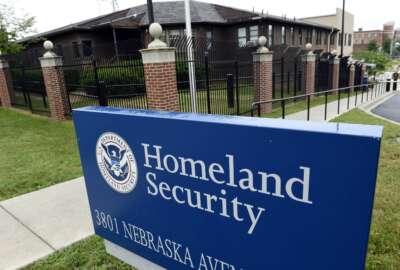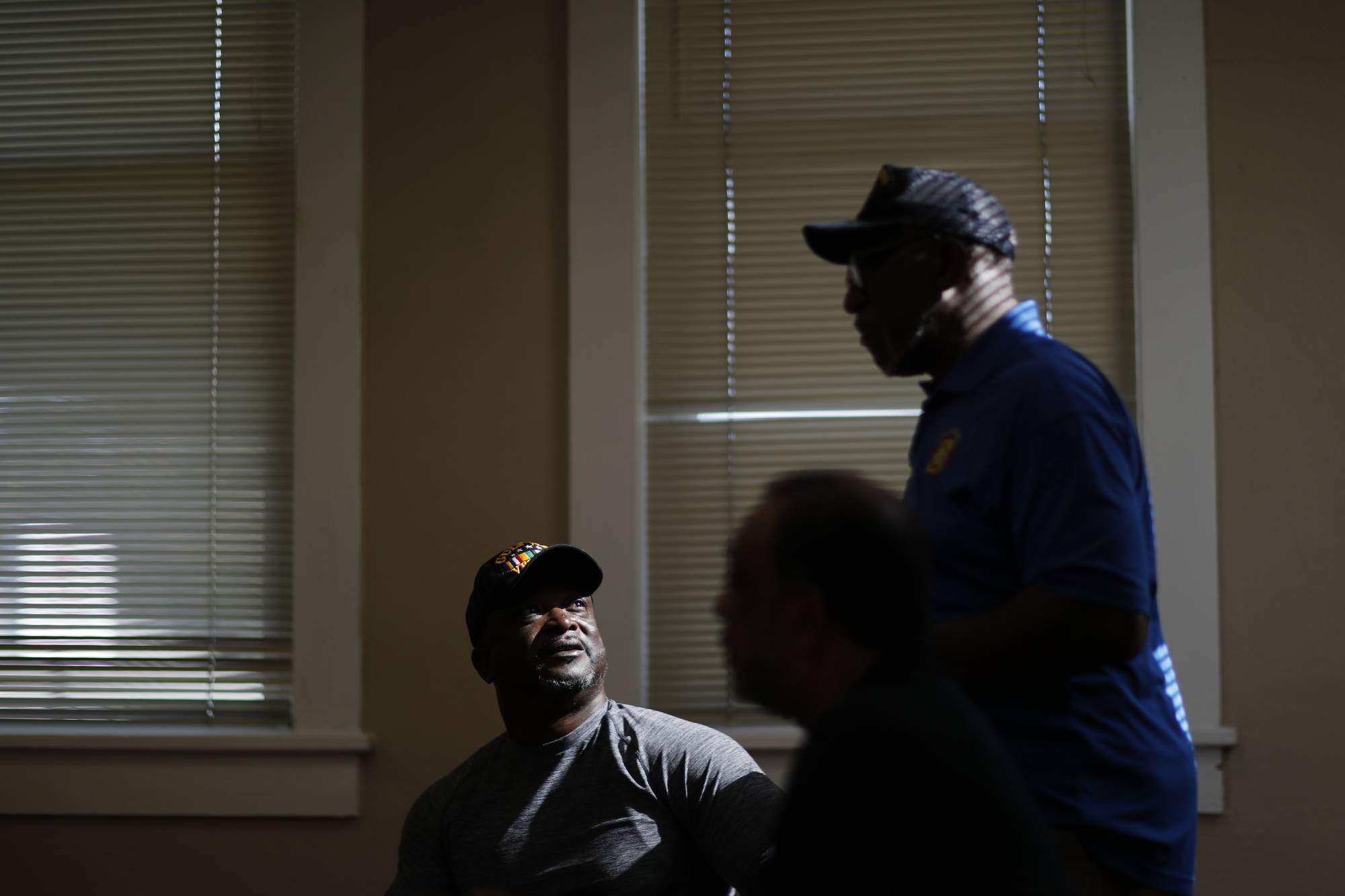Apprenticeships help St. Louis-area veterans find place in federal technology sector
In the race to find technology talent, sometimes you have to grow your own. Accenture Federal Services is doing just that with an apprenticeship program for vet...
Best listening experience is on Chrome, Firefox or Safari. Subscribe to Federal Drive’s daily audio interviews on Apple Podcasts or PodcastOne.
In the race to find technology talent, sometimes you have to grow your own. Accenture Federal Services is doing just that with an apprenticeship program for veterans in the St. Louis, Missouri area. For details, Federal Drive with Tom Temin turned to the managing director and lede of its Advanced Technology Center Accenture, Ali Bokhari, and one of the apprentices now working as a full time engineer, Tyler Eccleton.
Interview transcript:
Tom Temin: Mr. Bokhari, good to have you on.
Ali Bokhari: Good morning, Tom. Thank you, glad to be here.
Tom Temin: And later, we’re going to hear from one of the apprentices, Tyler Eccleton. He’ll be with us in just a couple of minutes. But Ali starting with the whole Accenture Advanced Technology Center Network. What is that and how does that fit into the general Accenture picture?
Ali Bokhari: Tom, the network is a key component of our delivery mechanism. That is where we deliver our programs at scale in a repeatable way, delivering very predictable outcomes by virtue of the way we establish our way to do delivery.
Tom Temin: Alright, so you do delivery of technological solutions for federal agencies. And why did you pick St. Louis, Missouri, of all the cities possible for an apprenticeship program?
Ali Bokhari: We also have a large presence in San Antonio, Texas, that’s where our Base Technology Center is, we just expanded into St. Louis. We announced that a year ago, and that’s largely because of the mix of talent and the scale at which we need to grow the talent is there to be curated, really.
Tom Temin: And tell us more about the apprenticeship program itself, how you develop that, how you are expanding it, and why it’s different from say, internships, or just hiring people and training them.
Ali Bokhari: We started this journey with apprenticeship programs about five years ago in San Antonio, recognizing the pace at which we were needing to scale. And we realized that we needed to curate our talent. And that’s a really, really important piece of it. And our focus on veterans is very intentional. The kinds of work ethic and attitude we get, you can’t train for that, training for the technology is the easy piece. So we established partnerships with Joint Base, San Antonio, and we’re starting to lean in with Scott Air Force Base in St. Louis, tapping into those enlisted personnel who are transitioning out of the military, and offering them an opportunity to learn emerging technologies and hopefully continue their career journey with us.
Tom Temin: But I want to concentrate on that word, apprenticeship, because that seems to have special meaning relative to just again, hiring people and sending them off for training. Is there a difference? And if so, what is apprenticeship? What’s the significance of that particular term?
Ali Bokhari: The significance of that term, Tom, is really about hands on experience. So there’s really two programs that we are running. One is what we call the apprentice in training program, which lasts about 12 weeks. And these are individuals that we train on in one of five emerging technology areas that we see in high demand for. And we see this apprentice in training program as a pathway into the apprenticeship program, which is a full time employment with us. And it’s more of a learn as you go with mentorship, with teaching and working on real projects and honing your skills that way.
Tom Temin: And what are the top technology areas that you have demand for these days?
Ali Bokhari: It’s a lot around the digital space, Salesforce, ServiceNow, Applied Intelligence. So it’s all the usual suspects. So somebody’s going through the program is much better position to be able to find a career post military, particularly if their veterans
Tom Temin: And is the apprenticeship tied to a particular product, such as one you might need certification in, or is it more generalized than that?
Ali Bokhari: It’s tied to a technology track, generally. So we specialize with any individual in a particular area. Sometimes they go on to get certification, certainly most of them are good enough to get certified. But that’s not necessarily the targeted outcome for the program. The targeted outcomes for the program is to be job ready, whether you have the certification or not.
Tom Temin: So they can help Accenture deliver on the contracts you have with federal customers, in other words?
Ali Bokhari: That’s exactly right.
Tom Temin: And give us a sense of the numbers of people at a given time you have in the apprenticeship program. And do you have a ultimate goal of people that you want to say this is how many we apprenticed?
Ali Bokhari: In St. Louis, we’re targeting between 30 to 40 a year, and recognizing we’re just starting to scale up in St. Louis. In San Antonio where our program is much more mature, we have more scale. Over 100 people a year are going through our programs.
Tom Temin: And you’re pretty happy with how it’s gone so far?
Ali Bokhari: We are delighted. We’re absolutely delighted. The people going through the program more often than not, probably 90-95% of the time are job ready. And quite often they come and choose to work with us after they finish the program.
Tom Temin: We’re speaking with Ali Bokhari, he’s managing director and lead of Accenture Federal Services Advanced Technology Center Network in St. Louis. And now we’re going to talk to Tyler Eccleton, who is a veteran that came through the apprenticeship program. Tyler, nice to have you on. Tell us about yourself.
Tyler Eccleton: Yeah, thanks, Tom. It’s good to be here. So I was in the military, in the Air Force for about four years as a computer programmer. And I went through Accenture’s apprenticeship program towards the end of my enlistment. The military has a program called the Career Skills Program, some people may know it as DoD Skill Bridge, which allows you to kind of reach out to civilian companies and gain some hands on experience for your last six months of service. And I was able to do that with Accenture Federal Services.
Tom Temin: And now you are functioning as a what for which agency?
Tyler Eccleton: Yeah, so I’m a software engineer, a senior analyst, and I came in about a year ago for Accenture Federal Services. And I work in the Microsoft Power Platform Specialty.
Tom Temin: And which federal agency are you with?
Tyler Eccleton: I’m unable to specify specifics of our clients and stuff like that. But yeah, I’ve been with a couple different clients in my time.
Tom Temin: Got it. Both civilian and DoD?
Tyler Eccleton: Yes.
Tom Temin: Okay. Well, that doesn’t narrow it down at all, but pretty much anywhere they send you in the government. I guess the question would be coming from the Air Force programming environment, where you’re sitting in a lot of rows with a lot of light blue shirts, and so forth — what is the difference? How do you like the private sector? How does it compare in delivering work to a contractor and then to the agency, versus working directly for an agency?
Tyler Eccleton: Yes. So really good question. I think one of the biggest differences is in the civilian world, and at least AFS specifically, is that you can kind of control how much is on your plate at any given time. In the Air Force, it’s kind of, we need you to do this, go do it. We don’t care if it’s too much, figure out a way. Whereas AFS is mindful of that work life balance. And if they want you to take on another project, they ask you, can you handle this and do you want to do it? So you can take on as much or your as little I mean, obviously, you can’t do nothing but you can control your workload very well within AFS.
Tom Temin: That’s true. Ali is still on the line. So you can’t talk about doing nothing. And I’m sure your days are packed to the gills, and you can barely get it all done as it is. But Ali, maybe just a word on how the fact of the pandemic has affected the program since people presumably can’t come in in person as much as you probably would like them to for their apprenticeships.
Ali Bokhari: Tom, we haven’t missed a beat with the pandemic. We pivoted to doing our training program 100% virtually, so the output has been as good as it was before. So it really hasn’t affected us in any detrimental way.
Tom Temin: All right, and you find that the mentorship relationship with apprentices can happen in a full manner, even if they haven’t been in person together?
Ali Bokhari: It is happening in a meaningful manner. Certainly, the eyeball to eyeball, person to person interaction is not happening, but we are still doing it in very meaningful ways.
Tom Temin: Ali Bokhari is managing director and lead of the Advanced Technology Center Network in St. Louis. That’s part of Accenture Federal Services. Thanks so much for joining me.
Ali Bokhari: Thank you, Tom. Glad to be here.
Tom Temin: And we also heard from Tyler Eccleton. He is now a software engineer at Accenture Federal Services. Tyler, good to have you on.
Tyler Eccleton: Thanks, Tom.
Copyright © 2024 Federal News Network. All rights reserved. This website is not intended for users located within the European Economic Area.
Tom Temin is host of the Federal Drive and has been providing insight on federal technology and management issues for more than 30 years.
Follow @tteminWFED






